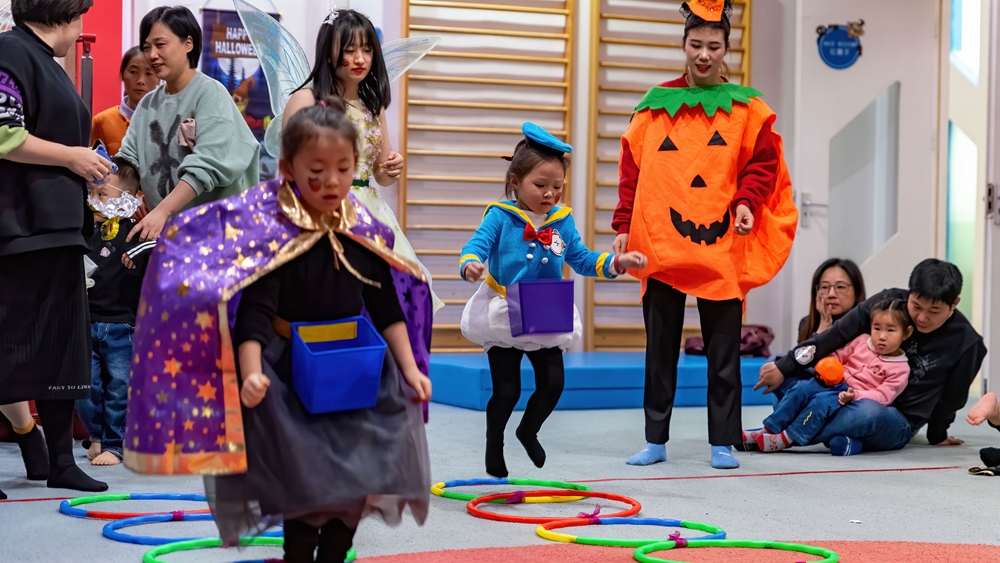
A boy plays at an early education institution in Xining City, Qinghai Province, northwest China, March 21, 2020. /CFP
A boy plays at an early education institution in Xining City, Qinghai Province, northwest China, March 21, 2020. /CFP
Pre-kindergarten education targeted at children aged less than three years has witnessed a boom in China. But can they guarantee long-term sound growth of the children?
The number of registered companies offering early childhood education had hit 37,000 by May 2020, according to data from Qichacha, an enterprise credit investigation agency based in east China's Jiangsu Province.
While a majority of people feel it is important to send children of that young age to educational institutions for targeted 45-minute classes, others have a different goal.
"Furniture, including tables, set in a relatively small activity area makes it inconvenient for my boy to move his limbs freely without hurting himself," Li Yahui, a media practitioner in Beijing, told CGTN.
Admiring the wide space for activities, Li said early education institutions are often equipped with facilities such as soft foam stairs which help the children practice their moves without getting hurt.
It's true not all families have enough room to let children enjoy this kind of toys at home.
Shen Xin, a media practitioner in Beijing, has the same consideration. She told CGTN that one of the reasons she send her daughter to such an institution is that she wants her daughter to have fun at a spacious place.
"Sending my little girl to take classes helps relieve the burden of my mother, who spends almost an entire day taking care of the baby girl," said Shen, adding that "the institution provides a warm place for the children to play with toys and talk to other children."

Children celebrate Halloween at an early education institution in Hefei City, Anhui Province, east China, October 30, 2020. /CFP
Children celebrate Halloween at an early education institution in Hefei City, Anhui Province, east China, October 30, 2020. /CFP
Both Li and Shen sent their children to the institutions when they were 7 months old. When asked whether their children showed any improvements after attending the courses, Li said her son had become more social, while Shen said her daughter enjoys the courses.
Jiang Li works at an educational institute in north China's Hebei Province. Her son began taking such courses at the age of seven months. She told to CGTN that such institutions provide a social environment for children, making them more independent and getting them ready for the world. She echoed Li's sentiments that her little boy performs better in social situations and has developed the willingness and courage to try new things.
An alternative to day care centers?
Families who lack guardians to take care of the children also find refuge in such early education institutions.
On China's Twitter-like Sina Weibo, a user said she often runs across her male neighbor in the morning when he is sending his months-old twins to early education institutions because there is no one to look after them during the day when he and his wife work.
Nowadays, kindergartens in China mainly enroll students aged between three and five, leaving a place for these institutions to enroll children aged under three.
A 45-minute class at such an institution costs at least 200 yuan ($31). The Chinese government has in recent years introduced some policies and regulations allowing more public resources to join the private sources and make up for the gap.
On May 9, 2019, General Office of the State Council published a guideline aiming to promote the care services of children who are younger than three years old. According to the guideline, a diversified care service system will be basically established in 2025 to serve children under the age of three in rural and urban areas in China.

Parents outside an early education institution which has been shut down, Beijing, China, August 14, 2020. /CFP
Parents outside an early education institution which has been shut down, Beijing, China, August 14, 2020. /CFP
Too young to study?
While most early childhood education institutions say their curricula aim to give children an all-round development, some of them run in a different direction.
Recently, a report by Guangming Daily questioned whether it's necessary for a child under three to learn counting from 1 to 80, which was thought to be learned by children in kindergartens.
According to a notice issued in July 2018 by China's Ministry of Education, children who are not old enough to be in primary schools must not be taught contents meant for primary school students.
Challenges to long-term growth
Moreover, there are other concerns that these institutions need to tackle for the long-term sound development of the children.
For example, the qualifications and skills of the teachers working at these institutions are questionable.
"In fact, pre-school education as a major in most universities and colleges in China only targets children aged between three and six, and the research on children under three is at a nascent stage," Liu Lingfang, director of the R&D center on pre-school education in Changchun Normal University, told Guangming Daily.
Liu said it was imperative to intensify supervision over early education institutions, as there had been reports about financial fraud and bankruptcy.

